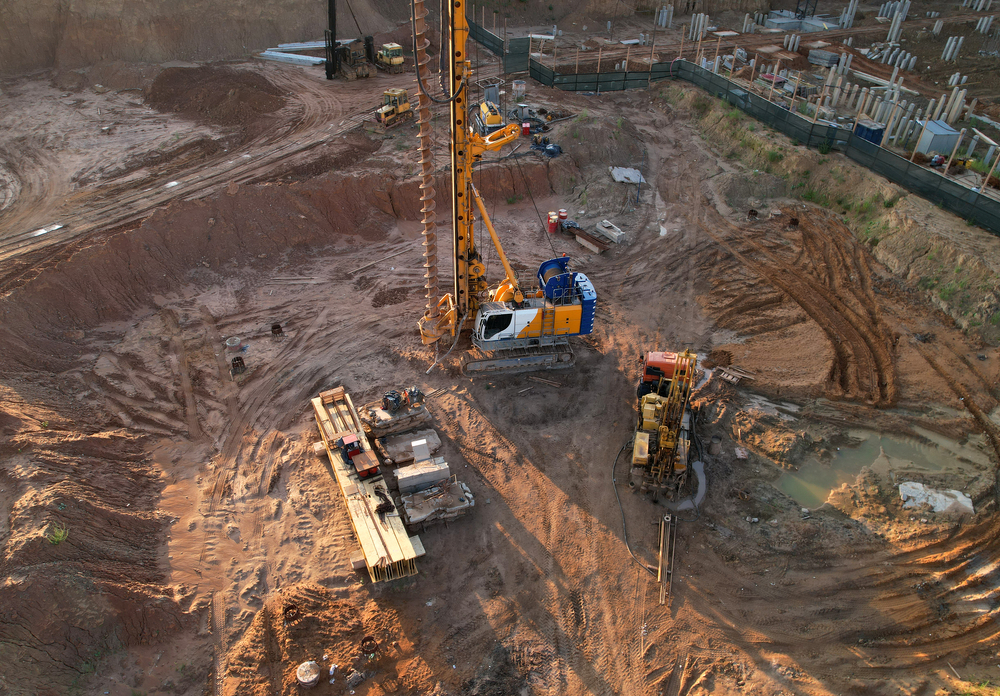4 Simple Techniques For Geotheta
Wiki Article
The Geotheta Ideas
Table of ContentsGeotheta Can Be Fun For EveryoneSome Ideas on Geotheta You Need To KnowThe Buzz on GeothetaExcitement About GeothetaThe Facts About Geotheta Uncovered

They perform site examinations, accumulate samples, do research laboratory tests, and analyze data to examine the viability of the ground for construction jobs - Consulting Engineers. Based on their findings, geotechnical engineers offer suggestions for foundation design, slope stability, maintaining frameworks, and reduction of geotechnical risks. They work together with other professionals, such as architects, structural engineers, and building groups, to make certain that geotechnical considerations are incorporated right into the total task layout and execution
By assessing the behavior and residential or commercial properties of soil and rock, they can determine possible geotechnical dangers such as landslides, dirt settlement, or incline instability. Their knowledge assists stop failings or accidents that could endanger lives and residential property. Below are some thorough duties and duties of a geotechnical designer: Site Examination: Geotechnical designers conduct site examinations to collect information on subsurface problems.
They interpret the data to comprehend the residential or commercial properties and behavior of the soil and rock, including their strength, leaks in the structure, compaction attributes, and groundwater problems. Geotechnical Analysis and Design: Geotechnical engineers assess the information collected during site investigations to assess the security and viability of the website for construction projects. They perform geotechnical calculations and modeling to evaluate factors such as birthing ability, settlement, incline security, side earth pressures, and groundwater circulation.
The Definitive Guide for Geotheta
Foundation Layout: Geotechnical designers play a vital role in making foundations that can securely support the designated structure. They analyze the soil problems and tons needs to figure out the suitable foundation type, such as superficial structures (e.g., footings), deep structures (e.g (https://penzu.com/p/952dfde2dba9ee4f)., piles), or specialized methods like soil improvement. They think about elements such as negotiation limits, bearing capacity, and soil-structure communication to create ideal structure layoutsThey examine building plans, display site activities, and perform field examinations to confirm that the layout suggestions are complied with. If unexpected geotechnical issues emerge, they analyze the circumstance and provide referrals for remediation or changes to the style. Risk Analysis and Reduction: Geotechnical engineers analyze geotechnical dangers and threats connected with the job site, such as landslides, liquefaction, or soil disintegration.

Partnership and Communication: Geotechnical designers function carefully with various other experts associated with a job, such as architects, structural designers, and building and construction groups. Efficient communication and partnership are important to incorporate geotechnical considerations into the general project style and construction procedure. Geotechnical designers offer technological knowledge, solution queries, and make certain that geotechnical demands are fulfilled.
Facts About Geotheta Revealed
Right here are some kinds of geotechnical designers: Foundation Designer: Structure engineers specialize in creating and assessing structures for frameworks. They evaluate the soil conditions, tons needs, and website characteristics to identify one of the most suitable foundation type and design, such as shallow foundations, deep foundations, or specialized methods like stack structures.They review the variables influencing slope stability, such as soil properties, groundwater problems, and incline geometry, and develop methods to protect against slope failures and mitigate risks. Earthquake Designer: Quake designers specialize in analyzing and designing structures to endure seismic forces. They evaluate the seismic risk of a site, review dirt liquefaction potential, and develop seismic layout requirements to make sure the security page and resilience of frameworks throughout earthquakes.
They execute area testing, accumulate examples, and examine the collected information to define the soil properties, geologic developments, and groundwater conditions at a website. Geotechnical Instrumentation Designer: Geotechnical instrumentation engineers concentrate on surveillance and determining the habits of soil, rock, and structures. They set up and keep instrumentation systems that keep an eye on variables such as dirt settlement, groundwater degrees, incline movements, and architectural displacements to assess efficiency and provide very early warnings of possible concerns.
The Buzz on Geotheta
They conduct tests such as triaxial examinations, loan consolidation tests, direct shear examinations, and leaks in the structure tests to collect data for geotechnical evaluation and design. Geosynthetics Engineer: Geosynthetics designers concentrate on the design and application of geosynthetic products, such as geotextiles, geogrids, and geomembranes. They use these materials to boost soil stability, enhance inclines, offer water drainage options, and control disintegration.They often tend to be investigatory people, which implies they're intellectual, reflective, and investigative. They are interested, methodical, reasonable, analytical, and logical. Some of them are also social, implying they're kind, charitable, participating, patient, caring, valuable, compassionate, tactful, and friendly - Engineer of Record.
In the workplace atmosphere, geotechnical designers make use of specialized software program devices to perform calculations, produce designs, and assess information. They prepare records, evaluation task requirements, connect with customers and staff member, and coordinate task activities. The office setup supplies a conducive setting for research study, analysis, and collaboration with various other experts associated with the project.
The Single Strategy To Use For Geotheta
They regularly see project websites to carry out website investigations, analyze geotechnical problems, and collect data for evaluation. These brows through include taking a trip to various locations, in some cases in remote or challenging terrains. Geotechnical designers may do soil sampling, conduct tests, and screen construction tasks to ensure that the geotechnical elements of the job are being implemented properly.Geotechnical engineers likewise work in specialized geotechnical labs. Geotechnical lab designers function thoroughly in these atmospheres, managing screening tools, running tools, and videotaping information.
Report this wiki page